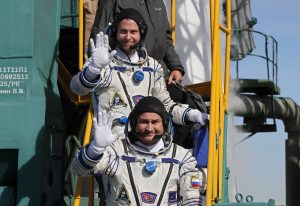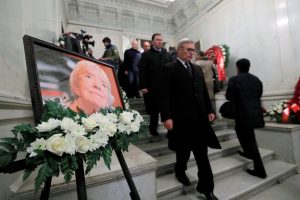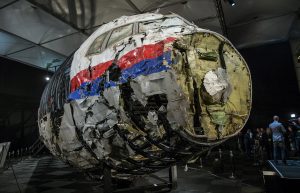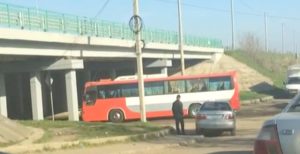
By Shamil Zhumatov
BAIKONUR COSMODROME, Kazakhstan (Reuters) – The two-man U.S.-Russian crew of a Soyuz spacecraft en route to the International Space Station was forced to make a dramatic emergency landing in Kazakhstan on Thursday when their rocket failed in mid-air.
U.S. astronaut Nick Hague and Russian cosmonaut Alexei Ovchinin landed safely without harm and rescue crews who raced to locate them on the Kazakh steppe quickly linked up with them, NASA, the U.S. space agency, and Russia’s Roscosmos said.
It was the first serious launch problem experienced by a manned Soyuz space mission since 1983 when a fire broke out at the base of the booster rocket while the crew was preparing for lift-off. The crew narrowly escaped before a large explosion.
Thursday’s problem occurred when the first and second stages of a booster rocket, launched from the Soviet-era cosmodrome of Baikonur in the central Asian country, were separating, triggering emergency systems soon after launch.
The Soyuz capsule carrying the two men then separated from the malfunctioning rocket and made what NASA called a steep ballistic descent to Earth with parachutes helping slow its speed. A cloud of sand billowed up as the capsule came down on the desert steppe.
Rescue crews then raced to the scene to retrieve them with reports of paratroopers parachuting to their landing spot.
The failure is a setback for the Russian space program and the latest in a string of mishaps.
Moscow immediately suspended all manned space launches, the RIA news agency reported, while Roscosmos chief Dmitry Rogozin said he had ordered a state commission to be set up to investigate what had gone wrong.
Unnamed Russian space industry sources cited by news agencies said it would be hard to establish what had caused the incident because the booster rocket segments involved had been badly damaged in their fall.
Jim Bridenstine, NASA’s administrator who was in Kazakhstan to witness the launch, said in a statement that the failure had been caused by an anomaly with the rocket’s booster.
“A thorough investigation into the cause of the incident will be conducted,” he said, saying the safety of the crew was the utmost priority for NASA.
Photographs released by Roscosmos after the rescue showed the two astronauts smiling and relaxing on sofas at a town near their landing site as they underwent blood pressure and cardiac tests.
Footage from inside the Soyuz had shown the two men being shaken around at the moment the failure occurred, with their arms and legs flailing.
Ovchinin, the Russian cosmonaut, can be heard saying: “That was a quick flight.”

International Space Station (ISS) crew members astronaut Nick Hague of the U.S. and cosmonaut Alexey Ovchinin of Russia board the Soyuz MS-10 spacecraft for the launch at the Baikonur Cosmodrome, Kazakhstan October 11, 2018. Yuri Kochetkov/Pool via REUTERS
U.S. SPACE PLANS
For now, the United States relies on Moscow to carry its astronauts to the International Space Station (ISS) which was launched 20 years ago. NASA tentatively plans to send its first crew to the ISS using a SpaceX craft instead of a Soyuz next April.
Kremlin spokesman Dmitry Peskov told reporters that the most important thing was that the two men were alive.
The ISS, launched in 1998, is a habitable artificial satellite in low Earth orbit which is used to carry out scientific and space-related tests.
It can hold a crew of up to six people and at present has three people aboard, two men — a German and a Russian – as well as one female U.S. astronaut.
“Rescue services have been working since the first second of the accident,” Rogozin wrote on Twitter. “The emergency rescue systems of the MS-Soyuz spacecraft worked smoothly. The crew has been saved.”
A Russian space industry source was cited by the Interfax news agency as saying that there was enough food onboard the ISS to last until April of next year.
The next re-supply run was meant to happen on Oct. 31, the source was quoted as saying, but that was now in doubt since the Progress supply ship was propelled by the same kind of rocket used in Thursday’s incident.
Questions are now likely to be asked about how efficiently Russia’s space program is running.
In August, a hole appeared in a Soyuz capsule already docked to the ISS which caused a brief loss of air pressure and had to be patched. Rogozin has said it could have been “sabotage”.
And in November last year, Roscosmos lost contact with a newly-launched weather satellite – the Meteor-M – after it blasted off from Russia’s new Vostochny cosmodrome in the Far East.
Rogozin said at the time that the launch of the 2.6 billion-rouble ($39.02 million) satellite had been due to an embarrassing programming error.
($1 = 66.6315 roubles)
(Reporting by Olzhas Auyezov in Kazakhstan and by Christian Lowe, Tom Balmforth, Polina Nikolskaya, Polina Ivanova, Polina Devitt in Moscow; Writing by Andrew Osborn; Editing by Richard Balmforth)










